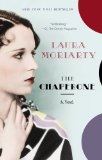Summary | Excerpt | Reading Guide | Reviews | Beyond the Book | Readalikes | Genres & Themes | Author Bio

One
The first time Cora heard the name Louise Brooks, she was parked outside the Wichita Library in a Model-T Ford, waiting for the rain to stop. If Cora had been alone, unencumbered, she might have made a dash across the lawn and up the library's stone steps, but she and her friend Viola Hammond had spent the morning going door-to-door in their neighborhood, collecting books for the new children's room, and the considerable fruits of their efforts were safe and dry in four crates in the backseat. The storm, they decided, would be a short one, and they couldn't risk the books getting wet.
And really, Cora thought, staring out into the rain, it wasn't as if she had anything else to do. Her boys were already gone for the summer, both of them working on a farm outside Winfield. In the fall, they would leave for college. Cora was still getting used to the quiet, and also the freedom, of this new era of her life. Now, long after Della left for the day, the house stayed clean, with no muddy footprints on the floor, and no records scattered around the phonograph. There were no squabbles over the car to mediate, no tennis matches at the club to cheer on, and no assigned essays to proofread and commend. The pantry and icebox actually stayed stocked with food without daily trips to the store. Today, with Alan at work, she had no reason to rush home at all.
"I'm glad we took your car and not ours," Viola said, adjusting her hat, which was pretty, a puffed turban with an ostrich feather curling down from the crown. "People say closed cars are a luxury, but not on a day like this."
Cora gave her what she hoped was a modest smile. Not only was the car covered, it had come with an electric starter. Cranking cars, no business for a lady, was how the ad went, though Alan had admitted he didn't miss cranking either.
Viola turned, eyeing the books in the backseat. "People were generous," she allowed. Viola was a decade older than Cora, her hair already gray at the temples, and she spoke with the authority of her added years. "Mostly. You notice Myra Brooks didn't even open her door."
Cora hadn't noticed. She'd been working the other side of the street. "Maybe she wasn't home."
"I heard the piano." Viola's eyes slid toward Cora. "She didn't bother to stop playing when I knocked. I have to say, she's very good."
Lightning shot across the western sky, and though both women flinched, Cora, without thinking, smiled. She'd always loved these late-spring storms. They came on so fast, rolling in from the prairie on expanding columns of clouds, a welcome release from the day's building heat. An hour before, when Cora and Viola were canvassing, the sun was hot in a blue sky. Now rain fell fast enough to slice green leaves from the big oak outside the library. The lilacs trembled and tossed.
"Don't you think she's a tiresome snob?"
Cora hesitated. She didn't like to gossip, but she could hardly count Myra Brooks as a friend. And they'd been to how many suffrage meetings together? Had marched together in the street? Yet if she passed Myra today on Douglas Avenue, Cora wouldn't get so much as a hello. Still, she never got the feeling that it was snobbery as much as Myra simply not registering her existence, and there was a chance it was nothing personal. Myra Brooks didn't seem to look at anyone, Cora had noticed, not unless she was the one speaking, watching for the impression she made. And yet, of course, everyone looked at her. She was, perhaps, the most beautiful woman Cora had ever seen in person: she had pale skin, flawless, and large, dark eyes, and then all that thick, dark hair. She was certainly a talented speaker—her voice was never shrill, and her enunciations were clear. But everyone knew it was Myra's looks that had made her a particularly good spokeswoman for the Movement, a nice antidote to the newspapers' idea of what a suffragist looked like. And you could tell she was intelligent, cultured. She was supposed to know everything about music, the works of all the famous composers. She certainly knew how to charm. Once, when she was at the podium, she had looked down at Cora, right into her eyes, and smiled as if they were friends.
Excerpted from The Chaperone by Laura Moriarty. Copyright © 2012 by Laura Moriarty. Excerpted by permission of Riverhead Books. All rights reserved. No part of this excerpt may be reproduced or reprinted without permission in writing from the publisher.
Your guide toexceptional books
BookBrowse seeks out and recommends the best in contemporary fiction and nonfiction—books that not only engage and entertain but also deepen our understanding of ourselves and the world around us.